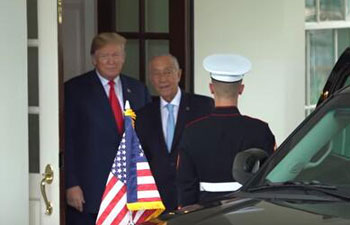by Julia Pierrepont III, Gao Shan
LOS ANGELES, July 2 (Xinhua) -- "I love food. I love drawing food in a beautiful way. Dumplings are symbols of the Chinese family and I wanted my film, 'Bao,' to be a celebration of family," China-born, Canadian director Domee Shi told Xinhua in a recent exclusive interview.
"Bao," a Pixar short, was released in theaters recently in front of Pixar's blockbuster animated feature, "Incredibles 2."
A tasty morsel, "Bao" explores the life of a Chinese immigrant mom living in Toronto with her inattentive husband who is struggling to cope with loneliness after her beloved son flies the nest.
Remarkably, the mom's deep, empty-nester angst turns to joy when a cute, leftover dumpling (a bao) comes alive in true Pinocchio fashion.
When asked why she wanted to tell this particular story, Shi said "Traditionally, Chinese parents don't say 'I love you' to their kids. They say it with food or by fussing over them. I didn't use dialogue in the movie because I wanted it to be a universal story that spoke to everyone."
As the daughter of an over-protective mom herself, Shi also wanted to explore the complex pros and cons of family dynamics.
"When we feel strongly about someone, we don't want them to leave," she said. "My mother would call me her 'precious little steam bun.' She actually said to me once, 'I wish I could put you back in my stomach!'"
When asked why she made the dumpling a boy instead of a girl, Shi said, "The film was inspired by my own story, but I didn't want it to be biographical. I wanted more room for creative freedom."
"With a boy, I could work in more gags and story points, like when his mom was so protective she wouldn't even let him play soccer with his friends; or when the boy bun gets older, I could give him a sesame seed beard and a blonde girlfriend for his mom to react to," she added.
Shi graduated from the animation program at Sheridan College. She began as a story intern at Pixar Animation Studios in June 2011.
When asked how she felt to be the first female director to direct a short film at Pixar, Shi said, "I'm humbled and honored. I'm very lucky, Pixar has always been supportive to me as a creative storyteller. I hope I am the first of many to follow."
"The fact that I am the first woman and first Chinese writer/director of a Pixar short is the best indication of the impact of the #Timesup movement on motion pictures and Pixar in particular. Things are changing. In some animations schools nowadays, there are 75 percent women and only 25 percent guys."
"The fact that this story got made is the best example of the change and progress Pixar has made to embrace stories from other cultures," she added.
But, to be chosen to break Pixar's glass ceiling did not come overnight. Shi had to pay her dues. Over the last seven years at Pixar, she worked as one of many animators on such classics as "Inside Out," "The Good Dinosaur," and "Incredibles 2," as she developed her creativity and style.
She spoke of "Inside Out" directors Pete Doctor and Ronnie Del Carmen, saying "Pete and Ronnie were generous leaders who shared their knowledge with me. I learned a lot from them."
Next, Shi had to run the gauntlet of a rigorous selection process. Pixar invited all their animators to work up three ideas for short animated films. About 60 artists applied and pitched their ideas to a panel of top Pixar executives and producers looking for their next golden goose.
Shi's cross-cultural, female-centric family story struck a chord with the judges and carried her through both rounds of judging to win the top prize. This gave her the opportunity to lead an entire 100-person Pixar production team to bring her story idea to life.
Shi feels she owes much to her parents, from whom she inherited her creativity. "As the child of immigrants, your parents are always reminding you to work extra hard and you are always trying to be worthy of all the sacrifices they made for you."
Born in Chongqing, southwest China, Shi resided in Toronto, Canada most of her life. Her mother is a gifted cook, while her father is an artist and arts professor at Sichuan Fine Arts. It was he who first encouraged her to draw.
In "Bao," Shi set out to make a short film that would profile real Chinese culture yet appeal to all audiences. "There are cultural differences, just like with 'Coco'. We had to explain to our American crew why we had to do things a certain way and what a traditional Chinese home would look like."
In true family fashion, she started by bringing her mom in on the project Chinese dumplings were supposed to look like. Her dad is from the north of China, where dumplings were invented, so she learned how to make them. "I used my mom's hands in the movie," she laughed.
Animation gives the director tremendous creative leeway. The characters and sets aren't real, so the director can change, morph, add and subtract anything he or she wants to change the tone, the story or the focus of their work.
For instance, Shi said, "The father doesn't appear much in the movie, but when he pushes the son into the Mom's bedroom when she's grief-stricken, it's his way of showing love for his family."
Shi demonstrates an apt instinct for how to focus attention on what matters: the mother's rich play of emotion as she "raises" her dumpling son and her shocking reaction to his decision to leave home with a bodacious blonde.
"I wanted the shock value of the reveal at the end - of how the mother's fantasy enabled her to process her son's decision to move away."
Now, with the success of "Bao," Shi is on the fast-track to animation stardom with a feature of her own in the Pixar pipeline.
The fact that she is able to show the universality of Chinese culture and family relations without sacrificing its uniqueness is a big part of what should make her upcoming feature something worth waiting for.













